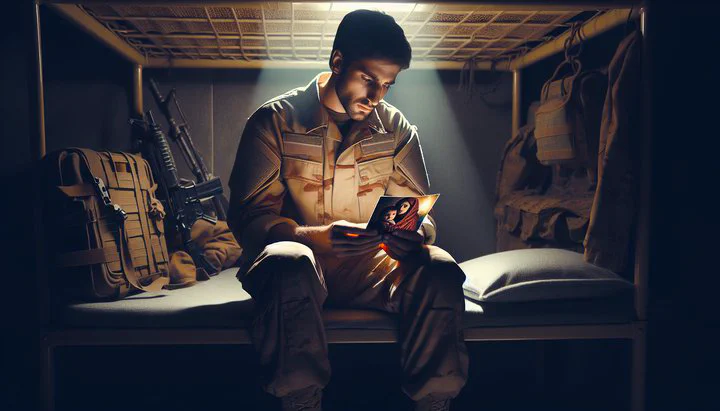Losing Feelings While Deployed

Losing Feelings While Deployed
Deployment takes you far from home, creating new challenges for your emotions and relationships. It can be one of the most difficult times for service members, often bringing a mix of emotions, especially feelings of disconnection and anxiety. When you’re far from home, it’s natural to feel isolated and worried about losing feelings for those you care about most.
Losing feelings while deployed can seem scary, but it’s a common experience. Many service members find themselves struggling to stay connected with loved ones back home. The distance and different time zones can make it difficult to keep in touch as often as you’d like. This can lead to feeling like you’re drifting apart, even when your relationships are strong.
The good news is that these feelings of being disconnected are normal. It’s important to know that feeling worried about losing feelings is perfectly normal. Many others have felt the same during their deployments. Understanding that these emotions are a part of the journey can help you manage them better. Acknowledging your feelings is the first step in addressing them.
Feeling disconnected from a partner or family member doesn’t mean you’ve lost your connection for good. It’s possible to maintain strong ties, even from afar. By recognizing these emotional challenges, you can start to take steps to stay close to your loved ones, ensuring that deployment doesn’t mean losing connection due to distance.
Maintaining Connection with Loved Ones
Staying connected with loved ones during deployment can be tough, but it’s not impossible. With a little effort and creativity, you can keep your relationships strong, even from miles away. Here are some practical tips to help you maintain that important bond.
First, make the most of technology. Keeping in touch can stop the fear of losing feelings while deployed. Schedule video calls so you can see each other’s faces, not just hear voices. Apps like FaceTime, Zoom, or WhatsApp make it easier to stay in touch. Even if time zones make it tricky, try to find a routine that works for both of you.
Beyond technology, think of creative ways to show you care. Writing letters might seem old-fashioned, but they can be a meaningful way to express your thoughts and feelings. Sending small care packages with reminders of home can also help bridge the distance. These gestures can make your loved ones feel special and keep the connection alive.
To make things easier, set up a shared online calendar for planning calls. It’s also important to set realistic expectations for communication. Deployment schedules can be unpredictable, and sometimes you might not be able to talk as often as you’d like. Be patient with each other and understand that sometimes, silence doesn’t mean you’re losing connection due to deployment. Being flexible and understanding can help reduce stress and keep your bond strong.
Remember, staying connected is about more than just frequent communication. It’s about maintaining intimacy and ensuring your loved ones know they’re in your thoughts. By being intentional about your efforts, you can overcome the challenges of deployment and keep your relationships thriving, even when you’re apart.
Coping Strategies for Service Members
Deployment can be emotionally taxing, and it’s crucial to have strategies to help you through. When you’re worried about losing feelings or struggling to stay connected, taking care of your mental health is vital.
Self-care is your first line of defense. Even small actions like sticking to a daily routine, exercising, and eating well can boost your mood and energy. These habits help build emotional resilience, making it easier to handle the ups and downs that come with being away from home.
Don’t underestimate the power of reaching out. Sharing your feelings with fellow service members who understand what you’re going through can be incredibly comforting. They might be feeling disconnected from a partner too, and talking about it can help both of you feel less alone. For example, sharing stories about how others have stayed connected can inspire new ideas. Your peers can offer advice or just listen, providing support when you need it most.
If you feel challenged, reaching out to mental health resources can be empowering. Many bases have resources that are confidential and free of charge. Talking to someone who can offer guidance and coping strategies can make a big difference. Remember, asking for help is a sign of strength, not weakness.
Lastly, focus on staying positive. It’s normal to feel anxious about losing feelings while deployed, but reminding yourself of the strong bonds you’ve built can help. Keep in mind that deployment is temporary, and maintaining hope can carry you through tough days. By using these coping strategies, you can navigate the emotional challenges of deployment and keep the connections with your loved ones strong.
Remember, deployment is just one chapter in your story, and your connections can remain strong through it all.